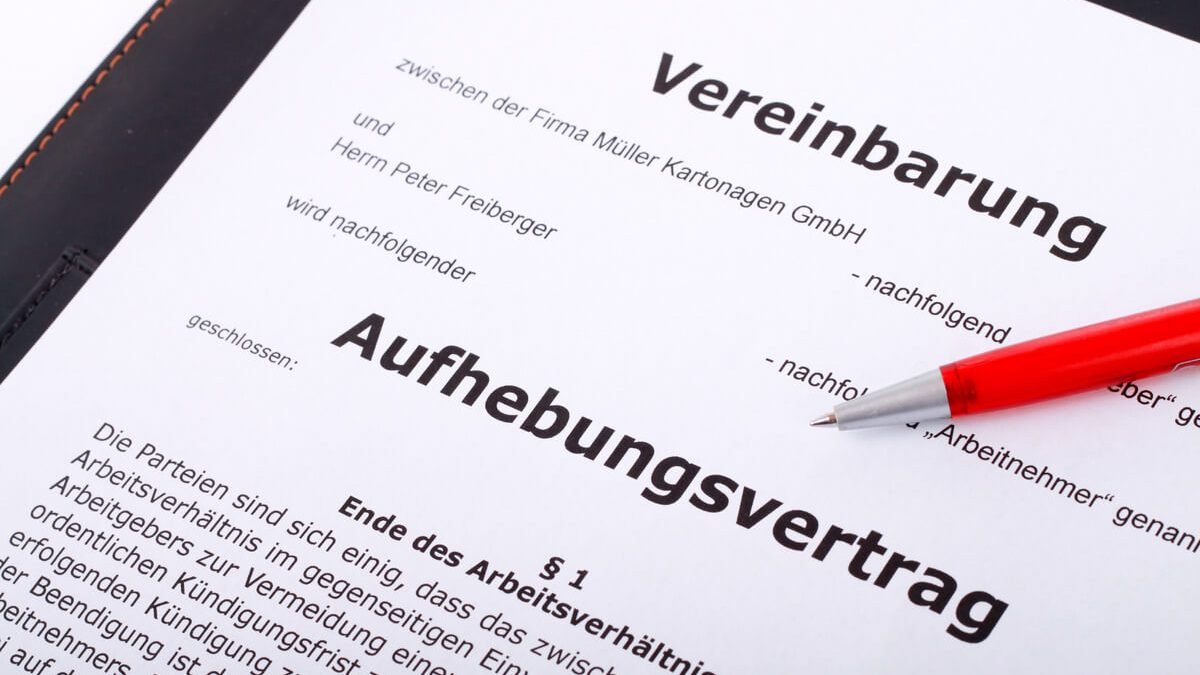
The world of employment can be complex, especially for expatriates working in a foreign country. In Germany, one of the significant aspects of employment law is the termination agreement (Aufhebungsvertrag). This article aims to provide expatriates with a thorough understanding of termination agreements within the German legal framework, offering clarity on what they entail, how to navigate them, and essential factors to consider.
What is a Termination Agreement?
A termination agreement, known as an “Aufhebungsvertrag” in German, is a mutually agreed-upon contract between an employer and an employee to terminate the employment relationship. Unlike a typical dismissal, it is not one-sided; both parties must consent to the terms laid out in the agreement.
Free initial consultation with a lawyer
Request a free consultation and receive a callback within 1–2 hours.
Key Features of a Termination Agreement
- Mutual Consent: Both the employer and employee agree to the termination terms.
- Written Form: The agreement must be in writing to be legally binding.
- Notice Period: Typically, there is no need to adhere to statutory notice periods.
- Severance Pay: Often includes a financial settlement for the employee.
- Employment End Date: Specifies the exact date when the employment ends.
- Other Clauses: May include provisions such as confidentiality agreements, non-compete clauses, and reference letters.
Advantages of Termination Agreements
- Flexibility: Unlike statutory termination, which follows rigid procedures and timelines, termination agreements offer flexibility in negotiating terms tailored to both parties’ needs.
- Avoiding Legal Disputes: By mutually agreeing to the termination terms, both parties can avoid potentially lengthy and costly legal disputes.
- Positive Reference: Employees who resign under a termination agreement often have a better chance of receiving a positive reference from their employer.
Disadvantages of Termination Agreements
- Pressure and Coercion: Employees may feel pressured into signing an agreement they are not fully comfortable with.
- Potential Loss of Unemployment Benefits: In some cases, signing a termination agreement can impact eligibility for unemployment benefits.

Calculate your severance pay now – free
- Calculate your potential severance pay
- Learn how to negotiate a higher severance
- Speak to an experienced employment lawyer
Steps to Take Before Signing
- Understand Your Rights: Familiarize yourself with your rights under German employment law. This includes knowing the terms of your current employment contract and what you are entitled to in case of termination.
- Seek Legal Advice: Consult with a lawyer who specializes in German employment law. They can provide valuable insight and help you understand the implications of the agreement.
- Evaluate the Offer: Consider the severance pay, notice period, and any other terms offered. Compare them with what you might receive if you were terminated without a mutual agreement.
- Check for Clauses: Pay special attention to any clauses regarding non-compete, confidentiality, or any obligations you might have after the termination.
Important Considerations for Expats
- Work Visa and Residence Permit: As an expat, your ability to stay in Germany might be tied to your job. Ensure that you understand how terminating your employment affects your work visa and residence permit.
- Tax Implications: Termination payments and severance can have specific tax implications. Consult with a tax advisor to understand how these payments might be taxed.
- Language Barriers: If German is not your first language, consider having the agreement translated and explained by a legal professional who speaks your native language.
- Cultural Differences: Be mindful of cultural differences that might influence negotiation styles and expectations in the German workplace.
What Should be Included in a Termination Agreement?
- Employee and Employer Details: Names, addresses, and roles in the company.
- Reason for Termination: A clear statement outlining the reason for mutually agreeing to terminate the contract.
- Notice Period Waiver: An acknowledgment that the standard notice period does not apply.
- Severance Payment Details: The amount, payment schedule, and any conditions tied to it.
- Final Working Day: The agreed-upon date when the employment will officially end.
- Utilization of Vacation Days: Clarify whether remaining vacation days will be taken or compensated monetarily.
- Confidentiality Clause: Both parties agree to keep the terms of the agreement confidential.
- Non-compete and Non-solicit Clauses: Any restrictions on future employment within the same industry.
- Company Property: Procedures for the return of any company property still in the employee’s possession.
- Reference Letter Agreement: Terms for obtaining a job reference.
Practical Tips for Navigating Termination Agreements
- Take Your Time: Don’t rush into signing the agreement. Take the necessary time to review and understand it thoroughly.
- Negotiate: Understand that elements like severance pay and additional benefits are negotiable. Don’t hesitate to discuss terms that are more favorable to you.
- Document Everything: Keep copies of all communications and documents related to the termination agreement.
- Follow-Up: Post-signing, ensure that all agreed payments and benefits are received as stipulated.
Conclusion
Termination agreements are a critical aspect of German employment law, especially for expatriates dealing with the complexities of labor regulations in a foreign country. Understanding these agreements can empower you to make informed decisions, protect your rights, and negotiate favorable terms. Always seek professional advice to navigate this process smoothly and safeguard your future career prospects in Germany.

Free initial consultation with an employment lawyer
- Free, no-obligation initial consultation with a lawyer
- Receive a callback within 1–2 hours
- How to negotiate a higher severance payment






